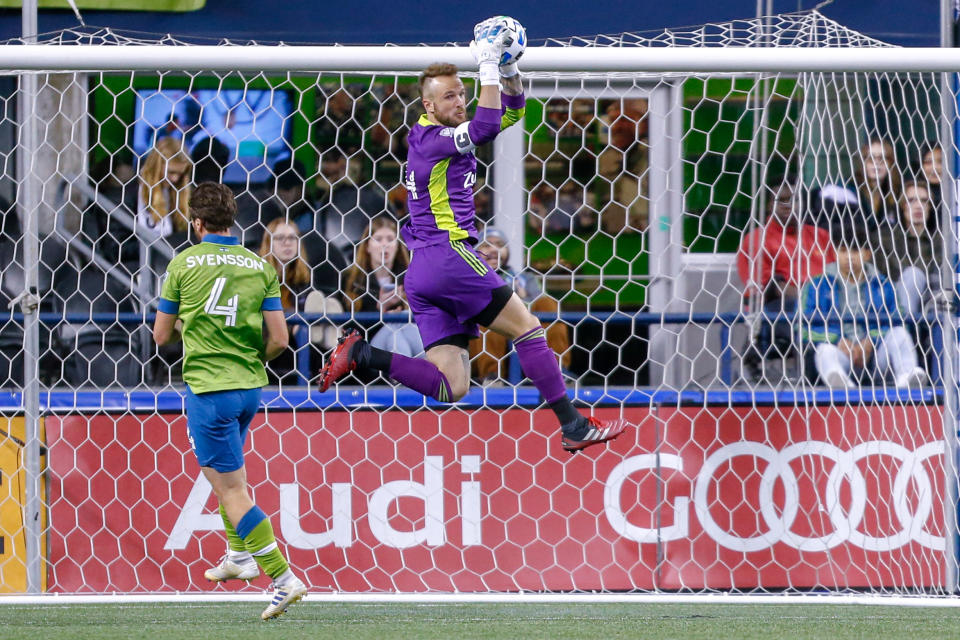Why MLS might be better positioned to withstand the coronavirus impact than other soccer leagues
Soccer has never faced anything like this before. There is no protocol or precedent for the sport to follow in light of the global coronavirus pandemic, which has forced every major league on the planet to suspend for the foreseeable future. It’s not just a question of when top-level soccer will return, but how.
Most of these competitions, from the Champions League to the Premier League to La Liga, are wrestling with various concepts of how to conclude seasons that are three-quarters finished already.
Major League Soccer has rolled down the shutters as well. But while its European counterparts are struggling with the logistics — not to mention the financial implications — of such a lengthy hiatus, MLS might well be in a better position to deal with the unprecedented situation.
For starters, the 2020 MLS season has only just begun. While the Premier League must untangle a web of competing interests and agendas to decide how to finish its current campaign, MLS doesn’t have the political challenge of having to hand out titles and final league positions on the basis of an incomplete set of results.
MLS’s calendar-year schedule also gives it some leeway in when the season can be resumed. Unlike European leagues, which have to factor in preseasons that take place during the summer and regular seasons that start in August, the only pressing matter for MLS is the 2020 campaign.

“Once we are comfortable that we can get our players with three to four weeks of training, and that we have the guidance that we can get crowds back into our stadiums, then we will then begin the relaunch of our season,” commissioner Don Garber told ESPN recently. “Our intent is to play as many games as we possibly can.”
Yahoo Sports’ Doug McIntyre also reports MLS could hold MLS Cup in December at a neutral site, which would push the season well past its original end date of Nov. 7.
As a league with only 25 years of history, MLS has a level of freedom that its more historic European counterparts do not. MLS’s format also includes playoffs, which permits the league a degree of creativity in determining a champion. It would be feasible, for instance, to shorten the regular season to extend the playoffs if that was the best way to resolve the 2020 season.
On top of this, the centralized structure of MLS should, in theory, better protect the division and its member clubs against any financial woes from the coronavirus crisis. Atletico Madrid, Juventus and Barcelona have all announced pay cuts for their players, with the financial damage expected to be even greater at lower levels of the European game.
In MLS, however, player and front office staff contracts are held centrally, and this gives clubs a measure of security that most European clubs don’t have. On Wednesday, Yahoo Sports reported that commissioner Don Garber and other full-time staff will take pay cuts, but no full-time workers will be furloughed or laid off for now, and players will continue to be paid by their clubs.
This isn’t to say that MLS is insulated from the effects of the coronavirus crisis. Far from it. Unlike most major European leagues, MLS is more dependent on gate receipts than it is on broadcast revenue. While Premier League clubs, for instance, are protected by lucrative TV deals, MLS clubs aren’t.
Plans have been discussed in in the EPL for fixtures to be completed behind closed doors. This could require broadcasters to cover all games live, giving supporters armchair access at a time when they are restricted from taking a seat in the stands. The exact terms of such a contingency plan aren’t clear, but given that each live TV broadcast commands over $10 million from domestic rights alone, it’s possible that Premier League clubs could emerge from this situation with their pockets lined.
MLS’s modest TV deal, which amounts to a modest $90 million per season, will make it difficult for its clubs to do the same. For context, NBC pays $166 million per season to broadcast the Premier League in the United States. It’s therefore unsurprising that, according to reports, MLS would prefer to postpone games rather than play them behind closed doors, even if the TV cameras are turned on.
The long distances covered by MLS teams between fixtures also presents a unique challenge. Clubs are only permitted to take a select number of charter flights over a single season, and coronavirus-related restrictions on commercial travel could prove troublesome. Traveling by bus, as European teams frequently do, isn’t always an option.
All teams and leagues have a role to play in response to the coronavirus pandemic, so while the preservation of a soccer season might appear a trivial concern, there is a societal benefit to keeping the curtain raised and the show going.
MLS, in many ways, stands a better chance of doing that than many of the European soccer leagues.
More from Yahoo Sports:




